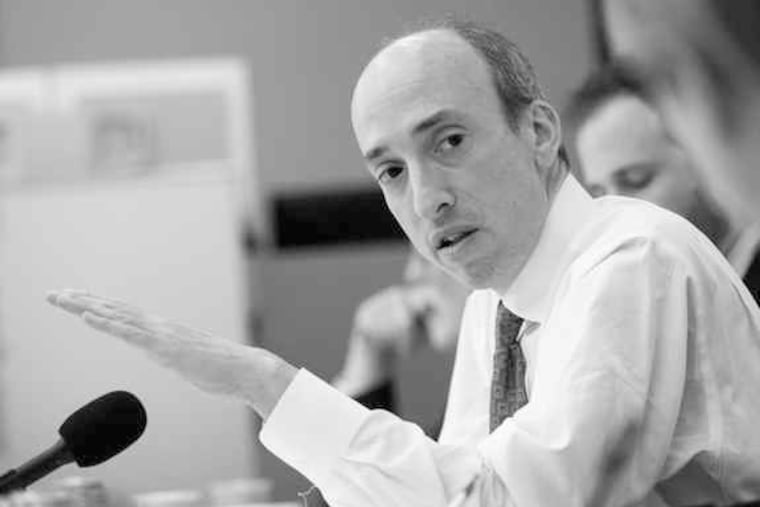Consumer Watch: Rise of the 'anti-lobbyists'
For those counting on Washington to address today's economic mess and prevent tomorrow's, there is little as maddening as the idea that key decision-makers hear only from big financial players and the pinstripe lobbyists who represent them.

For those counting on Washington to address today's economic mess and prevent tomorrow's, there is little as maddening as the idea that key decision-makers hear only from big financial players and the pinstripe lobbyists who represent them.
That sense was fed by a recent report that Treasury Secretary Timothy Geithner speaks daily "to a select group of powerful Wall Street bankers" he's known since his days running New York's Federal Reserve Bank. "When they call, Geithner answers," the Associated Press said.
That's why it's refreshing to check in with people like Barbara Roper, director of investor protection for the Consumer Federation of America.
Roper is one of a small crew of lobbyists - anti-lobbyists might be a better term - who don't occupy classy K Street digs or have links to lists of wealthy political contributors. Instead, their goal is to give a voice in national debates to a broader constituency - "average Americans," as Roper puts it, "who are paying for the bailouts."
Roper sees finance from a ground-level perspective.
She began working on investor protection in the mid-1980s, when she investigated self-dealing, incompetence, and fraud among financial planners. But it wasn't until the Enron collapse in 2001 that Roper began to connect the dots and realize how complex financial transactions posed threats to consumers and the everyday economy.
So what's her take on the status of new financial rules U.S. Rep. Barney Frank (D., Mass.) is trying to shepherd through the House?
Right now, Roper says, her biggest fear isn't Geithner's long-standing ties to Wall Street. It's Congress' apparent susceptibility to lobbyists who are back preaching market fundamentalism - the same old-time economic religion that got a bipartisan grip on Washington during the '80s and '90s.
Even Alan Greenspan, one of its patron saints, disavowed that fundamentalism after the U.S. economy and markets crashed, conceding that markets weren't always self-correcting. Roper's worry now is ironic: that the emergency measures taken in response to the collapse were almost too successful.
A year ago, there were legitimate fears of a second Great Depression. Now, the Dow industrial average has gotten back above 10,000, and Americans have notoriously short attention spans.
Roper says too many in Washington seem blind to the danger that we could bail out Wall Street's reckless risk-takers to save ourselves but fail to follow through with fundamental changes.
"That was the deal: We bail them out, but we fix the financial system so this won't happen again," Roper says. "But as the market has come back and we step back from the economic abyss, that promise is at risk of being forgotten."
All along, a key problem has been that too few people understand the risks posed by complex financial derivatives, the unregulated business-to-business agreements that Warren Buffett famously labeled "financial weapons of mass destruction."
Roper says it's a good thing that those who do include key members of the Obama administration, such as economist Lawrence Summers and Gary Gensler, chairman of the Commodity Futures Trading Commission.
Summers and Gensler both played roles in blocking derivatives regulation during the 1990s, when they worked in the Clinton administration and Gensler's predecessor, Brooksley Born, pleaded for new rules. This year, back in power but chastened by the collapse, both have been leading proponents of change.
Roper says Gensler, in particular, has been a steady voice. "He's just been phenomenal in making a complete about-face," she says.
The problem now is that the administration's solid outline was followed with loopholey legislation that some in Congress want to make worse, not better. That puts the burden back on Summers and Geithner.
"It remains to be seen: Are they going to back Gensler, or is he going to be a lone voice in this administration? If they don't hold Congress' feet to the fire, then they don't deserve as much credit as I gave them," Roper says.
(On Thursday, a plan to subject derivatives to regulation advanced in Frank's House Financial Services Committee.)
As she focuses on derivatives, colleagues at the Consumer Federation are pushing for other reforms they consider essential, such as establishing the Consumer Financial Protection Agency, with authority to regulate products such as mortgages and credit cards.
Roper says the relationship between high finance and consumer products is crucial even if it isn't obvious.
For instance, the bubble in housing prices was fueled not just by irrational exuberance but also by the creation of subprime and exotic mortgages. Market fundamentalists praised them as "financial innovation," but many just helped bid up housing prices to unsustainable levels.
Roper says some products probably deserve an outright ban. Others, such as adjustable-rate mortgages with price tags that jump in two or three years, might be regulated with a "suitability" standard like the one that keeps ordinary investors away from high-risk deals. Some people - say, third-year medical residents - can reliably expect their incomes to rise as rates adjust. But not many.
One of the clearest take-aways from last year's collapse, Roper says, is that "failure to do the basic consumer protection on the front end can have catastrophic consequences."